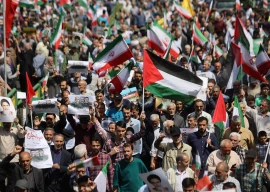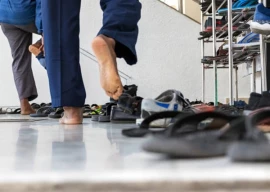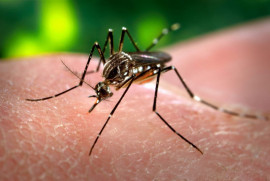
LANDIKOTAL, KHYBER AGENCY:
The 38-kilometre-long stretch of the treacherous Pak-Afghan Highway winding through the fabled Khyber Pass is the most perilous part of the journey for the oil tankers and container trucks ferrying military hardware and supplies for the US-led Nato troops in Afghanistan.
Paramilitary Frontier Corps and the Khyber Khasadar Force, a local tribal police, have surveillance posts atop almost every rugged mountain, but the Taliban manage to attack Nato supplies frequently because around-the-clock monitoring of the road from Jamrud to the Torkhum border crossing is impossible.
Terrorising ‘Tamachay Mullah’
The ambushes mostly take place in the Katakushta area in the Landikotal sub-division of Khyber Agency where the assailants can find easy escape routes.
“Most attacks are carried out by Abdul Azzam Brigade of the Tehreek-e-Taliban Pakistan (TTP),” local journalist Shahid Ali Afridi told The Express Tribune. “After every attack, they phone us to claim responsibility.”
The Abdul Azzam Brigade is headed by the TTP chief in Khyber Agency, Hazrat Nabi, aka Abu Musab, locally known as ‘Tamachay Mullah’.
A tribal source in Landikotal said that Nabi was the peshimam (prayer leader) at Masjid-e-Quba, a small roadside mosque in Landikotal, before he morphed into a Taliban commander.
Before Hazrat Nabi, Hijrat, an Afghan refugee known as Mustafa Kamran among the Taliban cadres, was the TTP chief in Khyber. “He was also the peshimam of a small mosque in Guddar village, in Jamrud sub-division,” said Anwerzada Afridi, the only broadcast journalist who had interviewed Hijrat in 2008. Hijrat, who was responsible for attacks on Nato supplies, was arrested and subsequently killed in police custody in 2009.
Terminals for Nato trucks dotted the Jamrud-Torkham Road until recently. But all of them have either been destroyed by the militants or closed down by the owners after threats.
“The last of the five terminals in and around Landikotal Bazaar – situated right below a post of the paramilitary Khyber Rifles – was pulled down nearly a month ago after the Taliban attacked it in the dead of the night and beheaded the two watchmen and the owner,” another tribal source told The Express Tribune.
Hazrat Nabi has also threatened local clerics not to offer funeral prayers for the Nato truckers and their cleaners killed in attacks. “On and off, he issues warnings to local tribesmen against facilitating Nato supplies,” said the second source.
Sectarian boundaries
Neither the TTP nor Lashkar-e-Islam (LeI) of Mangal Bagh, who was virtually ruling neighbouring Bara, could find a foothold in Landikotal and Jamrud.
This is attributed to sectarian differences among the local tribes. “Mainly Shinwari, Malagori and Shalmani tribes live in Landikotal and Jamrud. They are overwhelmingly Barelvis, while the TTP and LeI are ideologically Deobandis,” security analyst Khadim Hussain said.
“This is why the TTP and LeI could not find recruits in these two areas of Khyber.”
However, local tribesmen say this is because people in Landikotal and Jamrud are more educated than their cousins in Bara.
In 2008, Mangal Bagh had made an attempt to penetrate these areas when his armed vigilantes had taken over Darul Uloom Azizia Junadia – a mosque-cum-madrassa – sited along the road in Landikotal.
“For four or five days, he stayed with his men at the mosque for proselytising and recruitment, but local tribesmen stayed away and then he returned to Bara,” said a local tribesman.
Burnt trucks, crumbling roads
It is not the TTP alone which targets Nato trucks. “Local criminals, transporters and truckers are also involved in these attacks,” said Ijaz Ahmed, Senior Superintendent of Police (SSP) Peshawar. To substantiate his claim, Ahmed said that in the last week of May a Nato oil tanker belonging to the Mengal transport group was found burning in the Chamkani area on the outskirts of Peshawar.
“Police…found the driver and his helper missing. A fire was burning in the tanker’s engine,” he told The Express Tribune. “When it was checked, the tanker was almost empty. However, enough oil was left in the tanker to make sure the fire consumed it,” he added. “The tankers and oil are insured. The drivers and cleaners steal the oil and the transporters get the insurance money for their destroyed vehicles.”
Shakirullah Khan Afridi, President of the Khyber Transporters’ Association, was frank enough to concede that. “Yes, some drivers and cleaners are also involved in stealing oil from Nato tankers. But they do not detonate bombs on their vehicles,” he told The Express Tribune.
From Mianwali to Torkham there is no Nato terminal now, he said. “Our drivers and their helpers are vulnerable to Taliban attacks,” Shakirullah said. “Around 1,850 oil tankers and 300 containers have been destroyed since 2002. Close to 90 drivers and cleaners have been killed and over 150 injured in these attacks.”
Shakirullah disclosed that the frequency of such attacks has increased manifold following the killing of Osama bin Laden in the May 2 top secret operation by US Navy SEALS.
He also said that the mountainous road between the Takhtabaig area and Torkham has been crumbling – it is full of potholes.
“The tribal authorities don’t allow more than 40 vehicles at the Takhtabaig area at a time. The drivers park their vehicles along roadsides making them sitting ducks for the attackers,” Shakirullah said. He appealed to the authorities for security.
But SSP Ahmed said the security of Nato supply trucks was a complex issue.
“The responsibility of these vehicles shifts from one district administration to the other as they start their journey from Karachi. And when they cross into Khyber Agency, the political authorities become responsible for their security,” he added.
Published in The Express Tribune, July 8th, 2011.




































































COMMENTS
Comments are moderated and generally will be posted if they are on-topic and not abusive.
For more information, please see our Comments FAQ